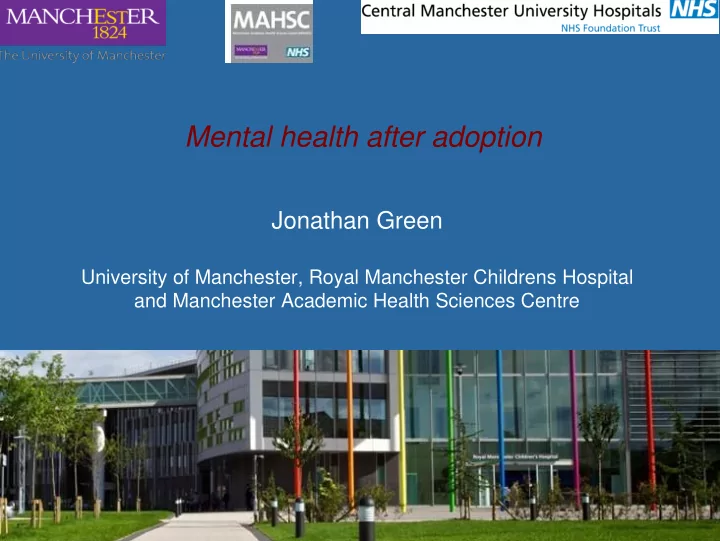

Mental health after adoption Jonathan Green University of Manchester, Royal Manchester Childrens Hospital and Manchester Academic Health Sciences Centre
The challenge • The nature of adoption • Some of the most complex mental health needs in the community - deserving the best health care • The development of a parallel therapy ecosystem • CAMHS provision Vision – • Health needs understood and identified • Integrated and high quality evidenced response
Why are the needs so complex? Natural focus on attachment (disruptions and forming) – but many other cumulative/additive risks in these children Familial – genetic • Pre-natal – exposure of developing fetus to alcohol, drugs, • trauma, stress – Post-natal – maltreatment, neglect, relational disruption • Layered consequences for biology, genetic expression, neurodevelopment, psychological development
What are the needs? • 25% (of 390 surveyed adopting families ) report ‘major challenges’ and complex needs. • 23% of children for whom placement ‘going well’ scored above clinical threshold on SDQ • MH problems in 97% of disrupted children; 82% in children remaining in placement with ‘major challenges.’ • Significant impact on family, problems with service access and perceptions of blame Selwyn et al, 2014
Orginating SDG Studies Attachment in young school age children 5-8yrs community and and • clinical populations, risk factors and outcomes - Manchester Child Attachment Story Task, MCAST Jonathan Green, Ruth Goldwyn, Charlie Stanley, Ming Wai Wan (Green et al 2000, • Goldwyn et al 2000, Green et al 2007, Futh et al 2008, Wan et al 2010) Social and attachment outcomes in adolescents 9-16yrs in LAC after • severe early adversity - Care Placement Evaluation, CAPE Catherine Kay, Jonathan Green (Kay and Green 2013, Green et al 2014) • Social and attachment outcome in children 5-9yrs adopted after early • adversity - Social Outcomes and Early Life Experience, SOCiAL Catherine Kay, Kathy Leadbitter, Richard Emsley, Ami Brooks, Amy Burns, Syeda Khatun, Anna • Roby, Yasmin Ahmadzadeh, Jonathan Green (Kay et al 2014 & Green et al 2015)
SOCiAL study • 60 children adopted from UK care – responding to advertisement through Adoption UK • 72% post-natal maltreatment/neglect; >55% pre- natal risk exposure; 20 removed at birth, mean care entry 12 months, adoption mean age 3 years • Gold-standard in-depth assessments of mental health and developmental disorder during middle childhood www.bbmh.manchester.ac.uk/social
65% 50% 49% 44% 17% 17% 13% Any MH Emotional CD/ODD Hyperkinetic DAD ASD Broad ASD These ‘disorders’ have evidenced treatments But in addition or underlying these there are attachment and relational predicaments and processes
Secure attachment Attachment Disorganisation (60-80%) RAD (??≈20%) Increasing Social Impairment DAD (≈50%) Quasi- Psychological/i autism nterpersonal ( ≈13%) Autism Multiple/Biolo gical
A spectrum approach adapted from Boris and Zeanah • Social skill in mentalising Secure attachment and competent responding (Organised) insecure • Less competent/more attachment – avoidant, aggressive responding ambivalent • Mentalising deficit. Lack of response strategies Disorganised attachment • Pervasive mentalising deficit and passive response Attachment disorders strategies • Link to quasi-autism in institutionalised samples
Evidence based interventions NEED New NICE guidelines Video Intervention to Promote Sensitive Parenting (VIPP) Attachment Parental sensitivity and behaviour training (parents, carers and professionals) Intensive training and support of foster/adoptive/residential placement Cognitive and interpersonal skills training for older children Range of interventions dependent on type. CBT, group, family or parent led. Individual therapies, play therapy, systematic desensitisation, guided self-help, Anxiety systemic therapies i.e. family therapy (NICE) PTSD Trauma-focussed therapies, e.g. CBT, Interpersonal therapy, EMDR (NICE) Group/individual parent/carer training programmes* CBT for child, group child-focussed social and cognitive problem solving, Multi- Conduct modal interventions i.e. MST, MTFC*, Systemic approaches i.e. family therapy (NICE) Pre-school: individual/group based parent training* and education School aged: Parent training* ADHD CBT and social skills training, occupational therapy Pharmacological treatment in severe cases (NICE) Attachment No specific evidence-based interventions for attachment disorders disorders Social communication interventions with teachers and/or parents inc. video feedback ASD and play based strategies, Social skills training, Speech and language therapy, music therapy (NICE)
How to deliver care? Assessment • Critical in complex presentations combining neuro-biological, • neurodevelopmental, psychological, family issues • Development and Well Being Assessment (DAWBA) - • Parent-rated (online/interview), Specific modules for the range of problems • • Computer generated risk profile • Clinician review of data
Specialist Hub Model of LAAC Services Example from Manchester
OUTPUT District Education Outreach CAMHS Voluntary and Independent CAMHS LAAC Local Authority Sector Tier 4 Social Development Clinic INPUT Research
Intervention DAWBA Review Assessment Clinical SDQ/DAWBA Assessment Screen Outreach CAMHS LAAC Local Authority Consultation Voluntary/Inde pendent sector Tier 4 ASF Pathway SDC
OUTPUT Education & DAWBA Review Assessment Knowledge Clinical SDQ/DAWBA Transfer Assessment Screen Clinical Outcomes CAMHS LAAC Local Authority Children & Families Evidence Research & Evaluation Tier 4 ASF Pathway SDC
OUTPUT District Education Outreach CAMHS Voluntary and Independent CAMHS LAAC Local Authority Sector Tier 4 Social Development Clinic INPUT Research
Recommendations • ‘Adoption awareness’ for CAMHS • Specific training, engagement and management protocols including attachment awareness • Systematic staged assessment of need (DAWBA) • Focused integrated management in regional specialist multiagency contexts • Evidenced based intervention strategies • Keyworker system for long-term support
DAWBA as an identification screening tool 3 settings Pre-adoption - completed with foster carers to help develop a prospective support plan in collaboration with after adoption services Pre-adoption order – placement with prospective adopters prior to adoption order process similar to pre-adoption In adoptive care, seeking support via ASF - relevant to the ASF fund.
Thank you to Our participating families The Social Team Dr Catherine Kay Dr Kishan Sharma Dr Kathy Leadbitter www.medicine.manchester.ac.uk/social Our funders and collaborators: jonathan.green@manchester.ac.uk
Recommend
More recommend